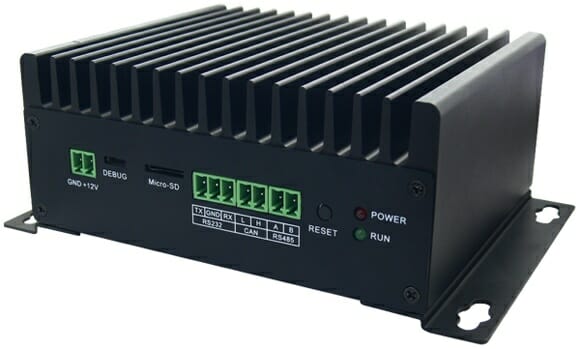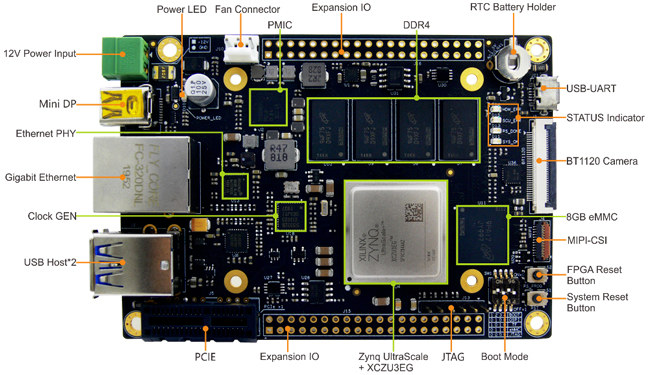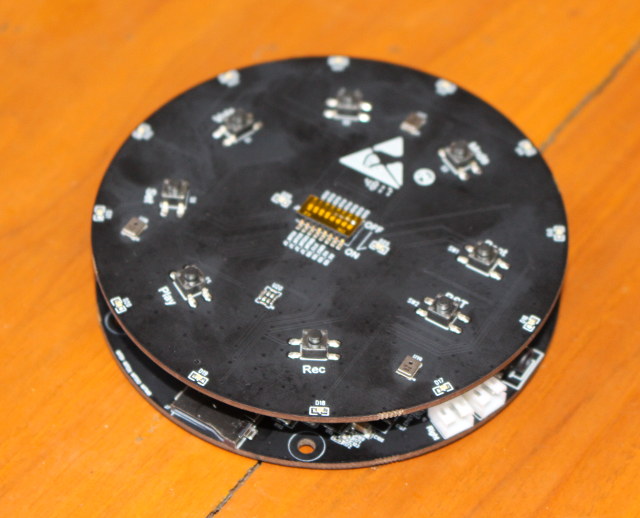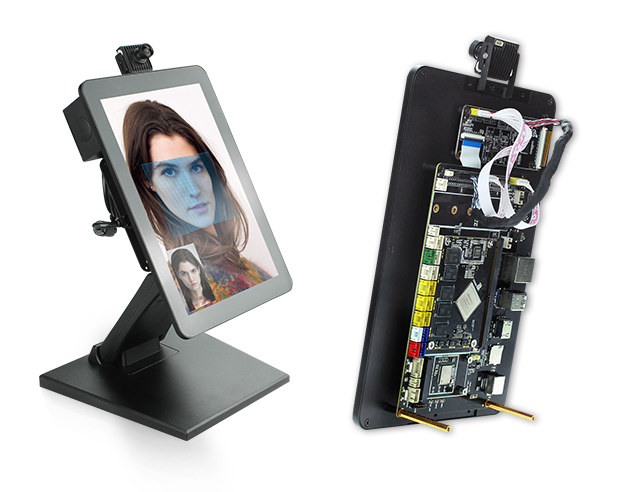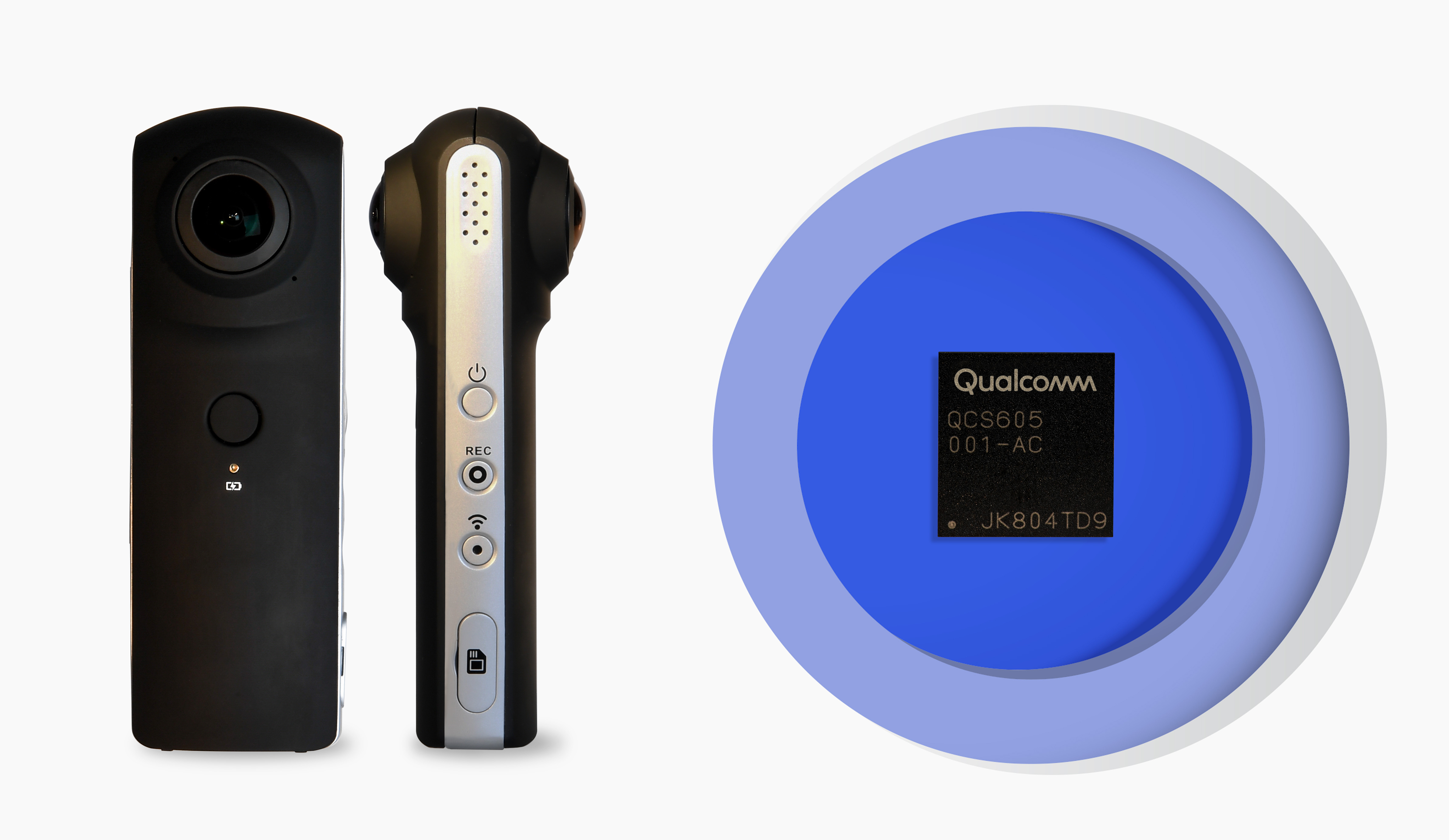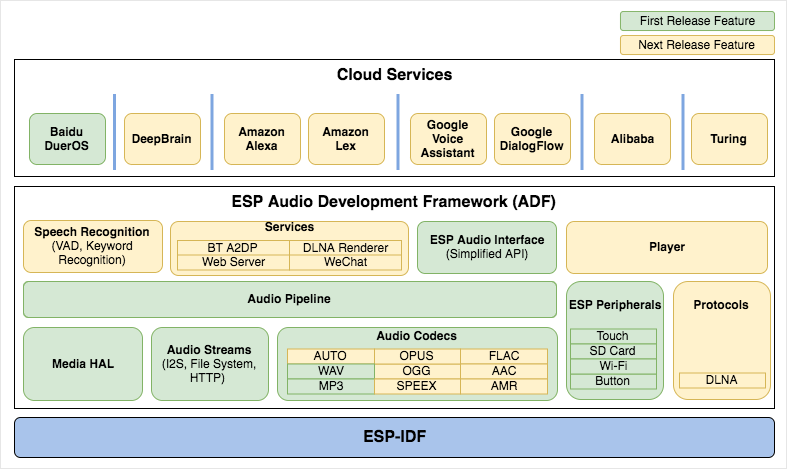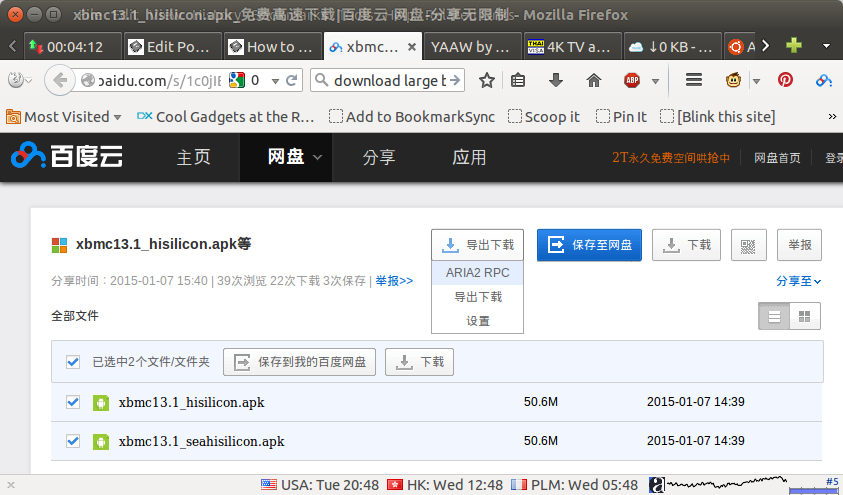Back in July of this year (2020), MYRI technology announced the MYIR’s FZ3 deep learning accelerator card powered by the Xilinx Zynq UltraScale+ ZU3EG Arm FPGA MPSoC and it is capable of delivering up to 1.2TOPS computing power. With only a few months since that launch, MYRI technology is now announcing another two related sets of products – FZ5 EdgeBoard AI Box and the FZ5 Card. The FZ5 EdgeBoard AI Box is an AI-focused computing platform that is based on the FZ5 AI Accelerator card which is an upgrade of the FZ3 card. The FZ5 looks more like a single board computer than an actual computing card. The FZ5 accelerator is powered by the Xilinx Zynq UltraScale+ ZU5EV MPSoC which features a 1.5 GHz quad-core Arm Cortex-A53 64-bit application processor, a 600MHz dual-core real-time Arm Cortex-R5 processor, a Mali400 embedded GPU and is capable of delivering up to 2.4 TFLOPS as compared […]
Zynq UltraScale+ Arm FPGA FZ3 Deep Learning Accelerator Card Supports Baidu Brain AI Tools
MYIR’s FZ3 card is a deep learning accelerator board powered by Xilinx Zynq UltraScale+ ZU3EG Arm FPGA MPSoC delivering up to 1.2TOPS for artificial intelligence products based on Baidu Brain AI open platform. The FZ3 card also features 4GB RAM, 8GB eMMC flash, USB 2.0 & USB 3.0 ports, Gigabit Ethernet, DisplayPort (DP) output, PCIe interface, MIPI-CSI and more. MYIR FZ3 card specifications: SoC – Xilinx Zynq UltraScale+ XCZU3EG-1SFVC784E (ZU3EG) MPSoC Quad-core Arm Cortex-A53 @ 1.2 GHz Dual-core Arm Cortex-R5 processor @ 600MHz Arm Mali-400MP2 GPU FPGA fabric System Memory – 4GB DDR4 Storage – 8GB eMMC flash, 32MB QSPI flash, 32KB EEPROM, MicroSD card slot Video Output – 1x Mini DisplayPort up to 4Kp30 Camera I/F 1 x MIPI-CSI Interface (25-pin 0.3mm pitch FPC connector) 1 x BT1120 Camera Interface (32-pin 0.5mm pitch FPC connector) Connectivity – 1x Gigabit Ethernet USB – 1x USB 2.0 Host, 1x USB 3.0 Host […]
Giveaway Week – ESP32-LyRaTD-MSC Audio Misc HDK
ESP32-LyraTD-MSC is a smart audio hard development kit based on ESP32 WiSoC that I plan to send to one of my readers as part of Giveaway week. I had the chance to test ESP32-LyraTD-MSC with Baidu DuerOS voice assistant back in February which requires you to speak Mandarin, but now the board has become more useful outside of China with the release of Espressif ESP-ADF audio development framework and support for Amazon Alexa and Google Assistant. To enter the draw simply leave a comment below. Other rules are as follows: Only one entry per contest. I will filter out entries with the same IP and/or email address. Contests are open for 48 hours starting at 10am (Bangkok time) every day. Comments will be closed after 48 hours. If comments are open, the contest is still going on. Winners will be selected with random.org, and announced in the comments section of […]
Firefly Baidu Face Recognition Kit Comes with Monocular, Binocular, or Structured Light Camera
Firefly AIO-3399J industrial board comprised of a Rockchip RK3399 SoM and a baseboard offering plenty of I/O & connectivity options has been bundled with various other accessories including a 10.1″ touchscreen display, and cameras to create a development platform for Baidu AI offline (aka “at the edge”) face recognition technology. The development kit is available in different variants with either a monocular camera, a binocular camera, or a structured-light camera. There’s also a deluxe kit with WiFi and a stand. Baidu Face Recognition Kit key specifications: SoC – Rockchip RK3399 hexa-core big.LITTLE processor with dual core ARM Cortex A72 up to 2.0 GHz and quad core Cortex A53 processor, ARM Mali-T860 MP4 GPU with OpenGL 1.1 to 3.1 support, OpenVG1.1, OpenCL and DX 11 support System Memory – 2GB DDR3 RAM Storage – 16GB eMMC 5.1 flash, micro SD card slot Display – 10.1″ 1280×800 capacitive touch display Connectivity – […]
Qualcomm QCS603/QCS605 “IoT” SoCs are Designed for AI and Computer Vision Applications
Qualcomm has unveiled the “Qualcomm Vision Intelligence Platform”, which aims at IoT devices with cameras leveraging artificial intelligence and computer vision. The first SoCs part of the platform are QCS605 and QCS603 manufactured with a 10nm process and equipped with an “advanced image signal processor” and the Qualcomm Artificial Intelligence (AI) Engine, as well Arm CPU cluster, Adreno GPU, and Hexagon DSP. QCS603 & QCS605 specifications: CPU QCS603 – 2x 1.6GHz Qualcomm Kryo 300 Gold cores, 2x 1.7GHz Qualcomm Kryo 300 Silver cores QCS605 – 2x 2.5GHz Qualcomm Kryo 300 Gold cores, 6x 1.7GHz Qualcomm Kryo 300 Silver cores Qualcomm Artificial Intelligence Engine DSP Qualcomm Hexagon 685 Vector Processor 2x Qualcomm Hexagon Vector eXtensions (HVX) GPU – Qualcomm Adreno 615 with OpenGL ES 3.2, Vulkan, OpenCL support Neural Processing – Qualcomm Snapdragon Neural Processing Engine programming interface with support for Tensorflow, Caffe/Caffe2, ONNE, Android NN; 2.1 TOPS @ 1w Memory […]
Espressif ESP-ADF Audio Development Framework for ESP32 Supports Baidu DuerOS, and Soon Amazon Alexa, Google Assistant, etc…
Espressif Systems have been working on audio applications like Smart Speakers based on ESP32 WiSoC with hardware development kits like ESP32-LyraTD-MSC Audio Mic HDK, and I could test it with Baidu DuerOS using Mandarin language. However, at the time (February 2018), there was not much else that could be done with the hardware kit, since no corresponding ESP32 audio software development kit had been made available. This has now changes since Espressif has just released ESP-ADF Audio Development Framework on Github. The framework will support the development of audio applications for the Espressif Systems ESP32 chip such as: Music player or recorder handling MP3, AAC, WAV, OGG, AMR, SPEEX … audio formats Play music from network (HTTP), storage (SD card), Bluetooth A2DP/HFP Integration with Media services such as DLNA, Wechat, etc.. Internet Radio Voice recognition and integration with voice services such as Alexa, DuerOS, Google Assistant As we can see […]
A First Look at ESP32-LyraTD-MSC Audio Mic HDK with Baidu DuerOS Assistant
Earlier this year, Espressif Systems had unveiled their ESP32-LyraTD-MSC Audio MiC HDK (Hardware Development Kit) which features an ESP32-WROOM module, a 4-mic array DSP, 3 microphones, an audio jack, and various I/Os. I received the board a couple of weeks ago, and while there’s no public information released yet, the company provided me with ESP32-LyraTD-MSC User Guide in English. Eventually, I’d expect Google Assistant and Amazon Alexa to be supported, but in the meantime I had to leverage my (lowly) Chinese language skills to get started since the kit is pre-loaded with firmware connecting to Baidu DuerOS voice assistant. ESP32-LyraTD-MSC Unboxing The kit came in a bland Espressif Systems carton box. Inside the package, I could only find one kit comprised of two boards. The bottom board read ESP32_MicrosemiDSP_Mainboard-V1, and does not show much apart from marking for connectors, headers and the power switch. While the top comes with eight […]
Downloading Files on Baidu, or via HTTP, Bittorrent or Metalink in Linux with BaiduExporter, Aria2 and YAAW
Most firmware files distributed by the manufacturers are uploaded to Baidu, but I’ve found the service not to be always reliable, especially for larger files. In Windows, people are recommended to use Baidu software (BaiduYunGuanjia), but there’s not such tool in Linux, so instead I investigate for command lines tools to download files from Baidu, and this lead me to two interesting tools called Aria2, a “lightweight multi-protocol & multi-source command-line download utility. It supports HTTP/HTTPS, FTP, BitTorrent and Metalink”, and YAAW “Yet Another Aria2 Web Frontend” with allow to start and monitor download locally or remotely. But let’s start with the first tool I found: pan-baidu-download, a Python script to download files from Baidu. To install it:
|
1 2 |
git clone https://github.com/banbanchs/pan-baidu-download.git cd pan-baidu-download |
We also need to install some dependencies (assuming python 2.7.x is already installed):
|
1 |
sudo apt-get install python-pip aria2 |
and then you can start downloading files as follows:
|
1 |
python bddown_cli.py download http://pan.baidu.com/s/somerandomcharacters |
But after posting a bug about password-protected […]


